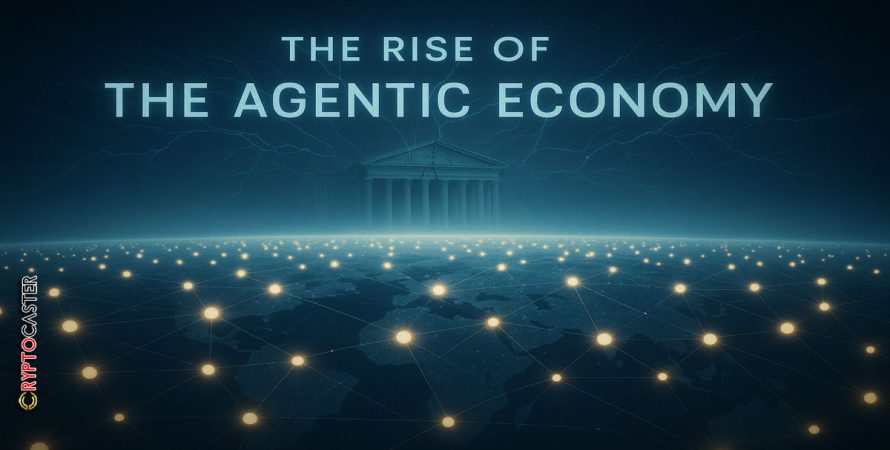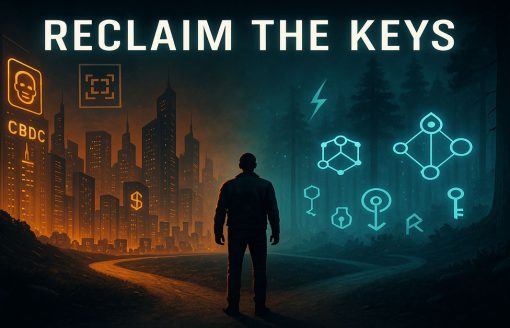As AI agents, DAOs, and programmable money converge, a new economic order is quietly emerging—one built not on central planning, but on autonomous action.
Stay in the know on crypto by frequently visiting Crypto News Today
I. A New Economic Species Is Emerging
The post-capitalist future isn’t being dictated in parliaments or Davos boardrooms. It’s being coded into existence—by autonomous agents, decentralized protocols, and intelligent systems that act without permission and coordinate without coercion.
This isn’t science fiction. It’s the beginning of what we call the Agentic Economy:
An economic system where software agents, smart contracts, and tokenized networks become the primary drivers of value creation, governance, and negotiation.
In this system:
- AI handles work.
- DAOs replace bureaucracies.
- Digital wallets signal intent.
- Tokens enable incentives and enforcement.
We are exiting the age of centralized trust and entering the realm of programmable sovereignty.
CryptoCaster Quick Check:
II. Defining the Agentic Economy
An agentic economy is not merely a digital one. It’s an economy of agents—human, machine, and hybrid—interacting according to rules they choose, goals they pursue, and intelligence they apply.
Agentic systems are:
- Autonomous: They initiate actions based on programmed or learned criteria.
- Adaptive: They learn, optimize, and evolve in real time.
- Incentivized: They respond to token-based reward systems and feedback loops.
- Composable: They interoperate across protocols and ecosystems.
- Trustless: They don’t require centralized intermediaries.
Imagine:
- A legal AI agent that drafts, reviews, and signs smart contracts on your behalf.
- A farm drone agent that trades carbon credits based on real-time emissions.
- A DAO agent that funds only projects with provable on-chain social impact.
- A meme-minting agent that identifies viral trends and auctions NFTs within seconds.
This isn’t utopia. It’s already being prototyped across Ethereum, Solana, Cosmos, and emerging AI-native chains.
III. From Institution-Centric to Agent-Centric Economies
The 20th century was ruled by institutions:
- Central banks issued currency.
- Governments regulated trade.
- Corporations monopolized data and labor.
But in an agentic economy, the individual or collective agent becomes the nucleus of economic life. Power migrates from institutions to software-driven intent systems.
Old model:
Humans labor → Institutions coordinate → Currency flows
Agentic model:
Agents act → Protocols coordinate → Value flows
This shift is as profound as the move from monarchy to democracy—or from analog to digital.
IV. Why It Matters Now
Three forces are converging to make the agentic economy not just possible, but inevitable:
- AI Personalization
Language models (like GPTs) can now represent user intent, style, goals—at scale. - Web3 Infrastructure
Blockchains allow trustless execution, identity, and settlement. - Tokenized Incentives
New forms of programmable money allow agents to transact, vote, and govern.
Together, they unlock economies where agents don’t just execute tasks—they form networks, govern themselves, and generate wealth.
V. This Isn’t Just Automation—It’s Autonomy
Critics might say, “We’ve had automation for decades.”
True. But automation obeys.
Agency decides.
Agentic economies are not about efficiency—they’re about freedom.
They shift the question from:
“How can we automate labor?”
to
“How can we coordinate intent without central control?”
That question opens the door to entirely new systems of production, value, and governance—outside legacy control structures.
VI. What Comes Next in This Series
In the coming installments, we’ll explore:
- Agents vs Institutions – Why centralization fears agentic freedom
- DAOs, AI, and the Rise of Hybrid Decision Systems
- The Ethics of Autonomous Economies – Who’s liable when agents go rogue?
- Designing Tokenomics for Agent Societies
- Agentic Sovereignty – How small nations and communities can opt out of empire
If this article brought you clarity, insight, or value—support the work that made it possible.
At CryptoCaster, we report on Web3, crypto markets, and institutional finance with no billionaire owners, no shareholders, and no hidden agenda. While mainstream media bends toward Elon Musk, BlackRock, and JPMorgan narratives, we stay focused on what matters: truth, transparency, and the public interest.
We don’t just cover the headlines—we investigate the power structures behind them. From FTX and Ripple to the quiet push for CBDCs, we bring fearless reporting that isn’t filtered by corporate interests.
CryptoCaster is 100% paywall-free. Always has been. To keep it that way, we depend on readers like you.
If you believe independent crypto journalism matters, please contribute—starting at just $1 in Bitcoin or Ether. Wallet addresses are below.
Your support keeps us free, bold, and accountable to no one but you.
Thank you,
Kristin Steinbeck
Editor, CryptoCaster
Support CryptoCaster: The Unfolding of Money
At CryptoCaster.world, we’re dedicated to bold journalism, sharp insights, and fearless commentary across blockchain, Web3, and crypto markets. Your **Bitcoin contributions** help us stay independent and continue delivering signal over noise.
🚨 CryptoCaster does not offer investment advice. Always DYOR—volatility is real, and risk tolerance matters.
Support our mission. Contribute BTC today.
🔗 Bitcoin Address:
3NM7AAdxxaJ7jUhZ2nyfgcheWkrquvCzRm
Thank you for backing our journalistic lens as we chronicle the Unfolding of Money — a saga still being written in real time.![]()
CRYPTOCASTER HEATMAP






